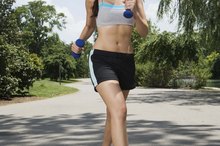How Can I Get Curves if I'm an Apple Shape?
If you've been described as having an apple-shaped body, then you probably carry most of your weight in your midsection. You may also have a flat chest and slim hips, which renders you nearly curveless. It is possible to create a curvier figure by changing up your fitness routine to target trouble areas, in addition to eating a nutritious diet. Aim for a mix of cardio, strength training and core work to add some curves to your physique.
Cardio
People with apple-shaped bodies will need to do cardiovascular exercise regularly to lose weight from their larger bellies. Cardio refers to any aerobic-type exercise that raises the heart rate over an extended period of time. Activities include:
- brisk walking
- running
- swimming
- cycling
- skiing
- skating
Cardio raises the metabolism to burn off extra calories and assist in fat-loss all over the body including the belly. A slimmer belly will aid in developing a curvier waistline. According to the NHS, adults over the age of 20 should aim for daily activity or at least 150 minutes of moderate-intensity, or 75 minutes of vigorous-intensity, physical activity per week 1. If you have extra weight to lose, then you will likely need to exceed these standards.
- People with apple-shaped bodies will need to do cardiovascular exercise regularly to lose weight from their larger bellies.
Core Strengthening
Exercises to Trim the Waistline for Men
Learn More
Add core strengthening to your weekly exercise regimen to create curves in your apple shape. Core exercises strengthen the abdominal region, back, hip flexors and gluteal muscles. These muscles help stabilize the body for everyday activities including walking, stair climbing and sitting. A strong core will also improve your posture to help you stand and sit taller to produce a slimmer physique on which a curvy waistline and butt can stand out more. Train the core every second day with exercises such as the plank, side plank, bicycle crunches and leg raises while contracting the abdominals.
- Add core strengthening to your weekly exercise regimen to create curves in your apple shape.
- These muscles help stabilize the body for everyday activities including walking, stair climbing and sitting.
Lower Body
Start a lower-body strengthening program to develop a curvier behind and legs. Lower-body exercises should target the gluteals to tone the buttocks muscles, hips to help pronounce the waistline and legs including the thighs and calves to help draw attention away from other curveless areas. Developing the lower body can help to balance out the top half of the body, according to Gaiam Life. Aim to do a lower-body routine consisting of eight to 10 exercises once a week in addition to your other exercise activities. Exercises should include:
- squats
- static lunges
- walking lunges
- side-lying leg lifts
- step-ups
- calf raises
- Start a lower-body strengthening program to develop a curvier behind and legs.
- Lower-body exercises should target the gluteals to tone the buttocks muscles, hips to help pronounce the waistline and legs including the thighs and calves to help draw attention away from other curveless areas.
Upper Body
Gym Machines That Get Rid of Love Handles
Learn More
Apple shapes may want to focus their exercise programs solely on the belly down. However, you should train the upper body as well to help build muscle and increase tone in the arms and back. A shapely upper body increases curve appeal and improves your appearance. You can add an upper-body strength-training circuit at the end of a cardio session or as part of a full-body workout once a week. Exercises should include triceps dips, pushups, shoulder circles and lateral raises with light weights that you can lift 10 to 12 times for three sets.
- Apple shapes may want to focus their exercise programs solely on the belly down.
- Exercises should include triceps dips, pushups, shoulder circles and lateral raises with light weights that you can lift 10 to 12 times for three sets.
Related Articles
References
Writer Bio
Jennifer Andrews specializes in writing about health, wellness and nutrition. Andrews has a Master of Science in physical therapy from the University of Alberta as well as a bachelor's degree in kinesiology. She teaches yoga and pilates and is a recent graduate of the Institute of Integrative Nutrition.







